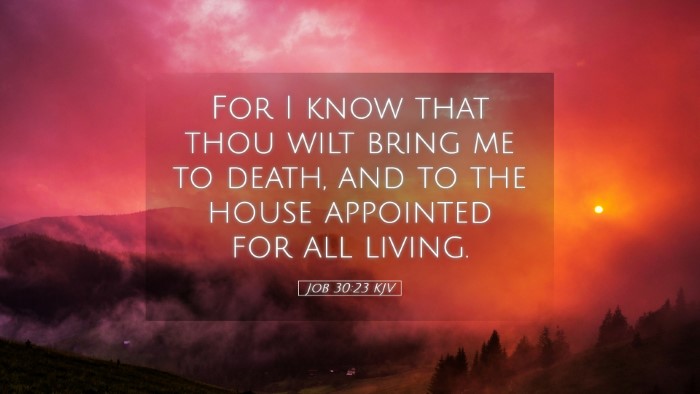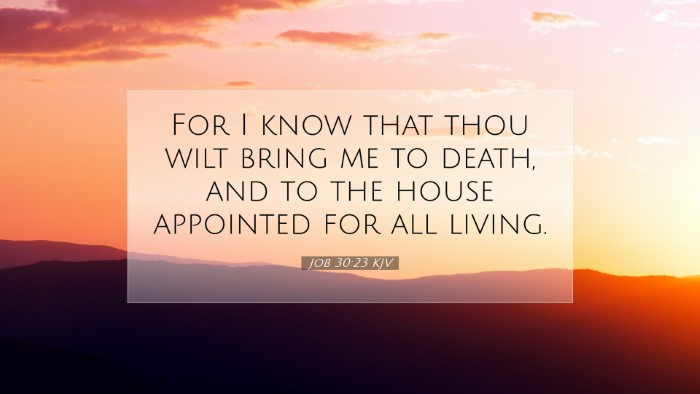Commentary on Job 30:23
Verse Context: Job 30:23 states, "For I know that thou wilt bring me to death, and to the house appointed for all living." This verse finds itself at a poignant juncture in the book of Job, where the themes of suffering, mortality, and divine sovereignty converge.
Exegesis of the Text
Understanding Job’s Lament: In this passage, Job articulates his awareness of the inevitability of death. This acknowledgment is not merely a reflection on his physical condition, as he endures profound suffering, but also indicates a deeper understanding of the human condition—that all beings are destined for death. Job’s lament is aimed towards God, expressing both resignation and an acute awareness of mortality.
Theological Insights
Mortality and Divine Sovereignty: Job’s recognition of the 'house appointed for all living' connects to the theological understanding of God's ultimate authority over life and death. Albert Barnes notes that this "house" symbolizes the grave or the afterlife, emphasizing God's sovereignty in determining the bounds of human existence.
Job's Despair and Hope
A Dual Aspect of Suffering: Matthew Henry comments on the duality in Job’s statement, highlighting that it conveys both despair and an unyielding grip on hope. Though Job is aware of his suffering and impending death, there remains an unshakeable faith that God is aware of his tribulations. This faith reflects a profound theological truth that suffering, while distressing, serves a greater purpose in the plan of God.
Human Limitation
Embracing Human Finite Nature: Adam Clarke emphasizes the limitations of humanity in the face of divine providence. Job’s acknowledgement of mortality reinforces the idea that life is fleeting and subject to the divine will. Clarke posits that this reality should lead believers to a deeper trust in God’s plan, despite the trials they face. This perspective encourages humility and reliance on God, especially during times of suffering.
Application for Pastors and Theologians
The Pastoral Perspective: For pastors, Job 30:23 offers an essential point of reflection when addressing the themes of suffering and mortality in their congregations. It serves as a reminder that the path through pain often leads to divine wisdom and understanding. When comforting the bereaved or those experiencing chronic pain, one can draw upon Job's insight into the certainty of death and the mystery of God’s purposes.
- Comfort in Mortality: Pastors should encourage congregants to embrace the reality of mortality with faith, emphasizing that death is not the end but a transition to the divine.
- The Role of Suffering: Addressing the judgement of trials, teaching that suffering can lead to spiritual depth and reflection, much as Job’s was used to convey profound truths about God’s nature.
Insights for Theological Study
Discussions on Death in Theology: Theologically-minded individuals can benefit from exploring the dichotomy of life and death as presented in Job 30:23. The text invites scholars to probe deeper into the nature of God’s relationship with humanity in the face of mortality. It raises essential questions:
- How does suffering shape our understanding of God?
- What does the acceptance of mortality teach us about our faith?
- What implications does this have on the doctrine of resurrection?
Conclusion
Job 30:23 encapsulates the struggle of human existence amidst divine sovereignty. As articulated by various commentators, this verse serves not only as a statement of inevitability but also as an invitation to deeper faith and understanding. Both believers and theologians are urged to dwell on the richness of these words, recognizing the blend of despair, hope, and the assurance of God's overarching plan in the tapestry of life and death.


